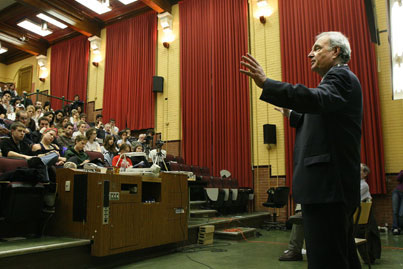
Former PM Paul Martin paid a surprise visit to McGill on March 26. Professor Norman Cornett credits an anonymous McGill supporter with convincing Martin to join them.
Owen Egan
Ex-PM drops in for a visit
Imagine walking into your Religion, Culture and Politics class one day to find that a former Prime Minister of Canada wanted your opinion on how to assist the war-torn continent of Africa.
Students on March 26 were put in just such a position when the right honorable Paul Martin was the surprise guest of Professor Norman Cornett's Faculty of Religious Studies class.
Last October, Martin and former president of Mozambique, Joachim Chissano, were named co-chairs of the advisory panel to the African Development Bank. And just the previous week, it was announced that Martin will work with Nobel Laureate Wangari Maathai to advise on a newly created fund to protect the Congo Basin Rainforest, the world's second largest after the Amazon.
Martin was a consummate pedagogue, at ease in front of the students and quick to make the class laugh with jokes made at his own expense. (Upon being introduced to SSMU president elect Jake Itzkowitz, he quipped, "you ran a successful election?")
Martin talked briefly ("a challenge for a politician," he said) about his involvement in Africa, but devoted most of the class to seeking input and discussing the continent's development issues. Students and invited guests asked sharp questions on the involvement of developed countries, the environment, security, and the need to respect African countries' sovereignty.
Martin believes that creating the conditions for a market system and ensuring fair distribution of profit will be the best route for Africa's development. "There needs to be a strong middle class," he said, "who will demand education for their children."
Africa is an up-and-coming global force to be reckoned with, and the future political leadership may belong to women. "Africa of 2040 could be the China of the turn of the 21st century," Martin said. By 2040, the population of under 1 billion will grow to a strong and young 2 billion.
Yet there are considerable obstacles to the continent playing a major role on the international stage, he warned. "If the 53 states have no coordination, they won't make it. If they do coordinate, there's no stopping Africa."
He advocates a unified economic community, much like the European model. Africa should think within its borders and foster internal markets instead of relying on imports. (Why bring in European jams when Africa is rife with fruit?) Also, if the nations' coffee growers were to create an allegiance, they could stand up to and compete against big players in the international market, like Folgers.
But it will be tough to balance infrastructure growth, such as more and better roads and encouraging internal transportation, with environmental responsibility. One student asked if Africa should be allowed to bend environmental requirements during this time of expansion.
"Absolutely not," Martin was emphatic. No country, not China or India, should be exempt from environmental responsibility. This requires co-operation from developed countries, however.
If Canadian researchers patent a clean coal burning system, they are obliged to share it with all countries at no charge.
One way to help Africa financially, Martin said, is for countries to offer full debt relief (as finance minister, Martin absolved the continent of all Canadian repayments) without undue stings attached. Foreign aid requirements can lead to African nations being overwhelmed with disparate demands—stop HIV/AIDS, educate girls -—which the countries are unable to tackle all at once. Governments also need to set realistic aid targets that they are committed to meet.
As Prime Minister, Martin recalls being chastised by his pal Bono for backing out of his promise to increase foreign aid from 0.3 to 0.7 percent of the budget.
It's hypocrisy for the world is to make demands on Africa, when their own back yard needs tending, Martin said, lamenting Canada's deplorable treatment of aboriginal citizens.
Lessons learned at home can apply abroad. Martin helped reverse Canada's brain drain with funding to universities to lure back ex-pat scholars and researchers—Africa would benefit enormously from repatriating their own highly educated populace.
Cornett regularly invites stars to his "improv think tank" classes (he asked Martin to put in a good word to Bono).
He takes a sociological approach to his religious studies classes, and wants to show students the connection between "core beliefs and how one lives out private convictions in the public domain."

